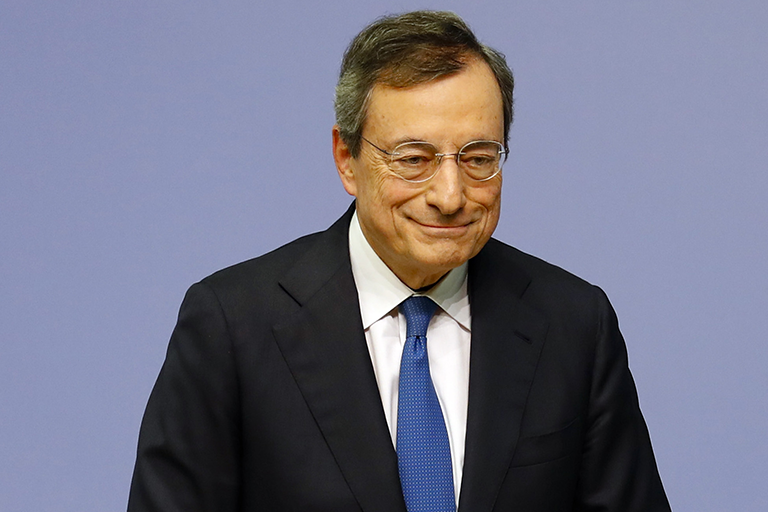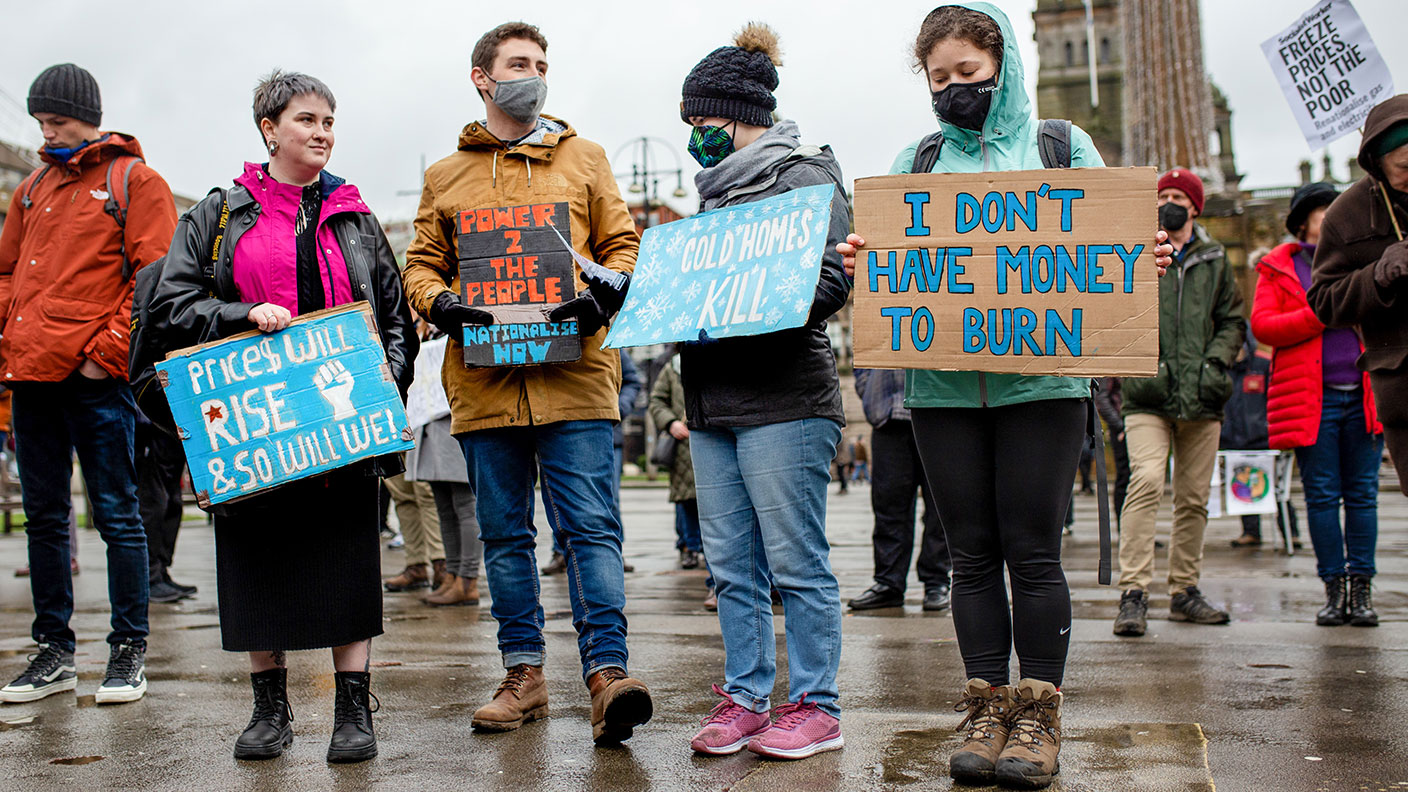Negative bond yields: could the 2020s mark the end of this freakish financial phenomenon?
If there’s one thing the 2010s will be notable for, it's the incredible things happening in the bond market. John Stepek asks if we've finally seen the back of negative bond yields.

Get the latest financial news, insights and expert analysis from our award-winning MoneyWeek team, to help you understand what really matters when it comes to your finances.
You are now subscribed
Your newsletter sign-up was successful
Want to add more newsletters?

Twice daily
MoneyWeek
Get the latest financial news, insights and expert analysis from our award-winning MoneyWeek team, to help you understand what really matters when it comes to your finances.

Four times a week
Look After My Bills
Sign up to our free money-saving newsletter, filled with the latest news and expert advice to help you find the best tips and deals for managing your bills. Start saving today!

It's the last "official" Money Morning of the year. In fact, it's the last one of the decade.
(I mean, I say that, but we will be sending you some exciting stuff over the Christmas period. You'll have plenty of reading material between now and 6 January, don't worry about that).
I could do an epic round up of the 2010s. I could do an epic round-up of the year.
MoneyWeek
Subscribe to MoneyWeek today and get your first six magazine issues absolutely FREE

Sign up to Money Morning
Don't miss the latest investment and personal finances news, market analysis, plus money-saving tips with our free twice-daily newsletter
Don't miss the latest investment and personal finances news, market analysis, plus money-saving tips with our free twice-daily newsletter
But to be honest, I think it makes just as much sense for me to talk about the one thing that has really been the prevailing theme both in the 2010s and in 2019 as a whole: the spectacular collapse in bond yields and the question of what a rebound would mean for financial markets.
Negative bond yields: the strangest financial event of the 2010s
If there's one thing the 2010s will be notable for, it's the fact that both 2016 and 2019 saw incredible things happening in the bond market.
In 2016, at the pinnacle of post-Brexit panic, we saw government bond yields across the world submerged in negative territory.
When markets later rebounded, I'll admit I thought that was it. I thought we'd seen the top for the bond bull market (remember that bond prices rise when yields fall and vice versa it's like a see saw). I was wrong. Mea maxima culpa. (Apologies for the bad Latin).
Turned out that markets were saving the best for last (unless of course, this wasn't the bottom either). By summer 2019, we saw a whopping $17trn-worth of government and corporate debt sink into negative territory.
In other words, people who bought these bonds and held them to maturity were locking in a guaranteed loss. And not just a loss after inflation a proper, nominal terms loss. (Of course, lots of people weren't planning to hold to maturity they planned to sell them on to even greater fools, but we've discussed this elsewhere.)
What was the problem? There was a lot of talk of recession. And trade wars played a role. But ultimately, what it boiled down to was this: investors got scared about Europe again.
European Central Bank (ECB) boss Mario Draghi was about to step down. He was widely perceived to be the man that had held disaster at bay by making sure the eurozone banking system could access all the free money it needed.
There were fears that when he stepped down, everything would go pear-shaped as the more aggressive "hard currency" tendency within the ECB decided to raise interest rates or be stricter. Also, negative interest rates were hurting eurozone banks, which can't make a profit at the best of times.
You could see this fear rising when you looked at a chart of the eurozone banks their share prices tumbled in the summer.
Anyway. Draghi managed to put a stop to all that by putting together a legacy that did two things: he reactivated quantitative easing and ensured that it'd be very hard for the "hard money" tendency to stop it by saying that it would go on indefinitely until the ECB's inflation target was in sight (which still seems a long way off); he also did a few technical things that meant that negative interest rates would stop being such a problem for the banks. (You can read more about that here).
Is this the beginning of the end for the negative bond yield era?
Since then since the most obvious deflationary time bomb in the financial system was effectively defused by Draghi's move bond yields have been ticking steadily higher.
It's also interesting that central banks are starting to wake up to the fact that negative interest rates create serious problems for the system. It's interesting that as the year is ending, Sweden has decided to ditch negative interest rates. The Riksbank last week lifted rates to 0%, "even despite signs of a weakening economy", reports the Financial Times.
Since the summer, the "pile of negative-yielding debt" has shrunk by $6trn. So at $11trn, we still have a pretty hefty chunk of the stuff floating around the global economy. But maybe this time it's on the way out for good.
That's not to say that it's going to be sunshine and roses from here on in. It's more that negative yields are such a strange phenomenon that I can't help but see them as a side effect of a post-2008 spike in fear of deflation.
If we can finally get to the stage where markets grow more convinced that we have in fact avoided a repeat of 2008 and that the world's politicians are now hellbent on growing their deficits as far as investors will allow, then we might just get to a point where the fear flips from being a fear of deflation, to a fear of inflation.
Will that happen next year? I don't know. That would seem like a quick turnaround. Maybe we get the good bit first the bit where deflation finally appears to be off the table and everyone gets excited about risk assets. Given how high valuations are that would probably see the world's "cheap" assets (anything value or non-US basically), going up fast.
Eventually we reach the scary bit when a bond bear market really starts to bite. But we'll cross that bridge when we come to it, I'm sure.
We discuss this a lot in the double issue of MoneyWeek magazine that brings 2019 to a close. Our roundtable experts talk about inflation and also about the potential disaster that the "reach for yield" may have stored up in one particular market. If you're not already a subscriber, rush now and get your first 12 issue for £12 so you don't miss it.
Get the latest financial news, insights and expert analysis from our award-winning MoneyWeek team, to help you understand what really matters when it comes to your finances.

-
 Should you buy an active ETF?
Should you buy an active ETF?ETFs are often mischaracterised as passive products, but they can be a convenient way to add active management to your portfolio
-
 Power up your pension before 5 April – easy ways to save before the tax year end
Power up your pension before 5 April – easy ways to save before the tax year endWith the end of the tax year looming, pension savers currently have a window to review and maximise what’s going into their retirement funds – we look at how
-
 Is the US in recession and does it matter?
Is the US in recession and does it matter?Analysis There's a heated debate over whether the US is in recession or not. But why does it matter? John Stepek explains
-
 Has the chancellor done enough to save the UK from recession?
Has the chancellor done enough to save the UK from recession?Analysis UK Chancellor Rishi Sunak announced a new package last week to ease the cost of living crisis. John Stepek explains whether the risk of a UK recession still remains.
-
 Is the UK too open to overseas takeovers?
Is the UK too open to overseas takeovers?Analysis Data shows that the UK is more open to overseas takeovers than other major markets. John Stepek asks: should investors care?
-
 How to manage your money as inflation just keeps rising
How to manage your money as inflation just keeps risingAnalysis Uk inflation is at a 30-year high – and it won't be falling any time soon. So what can you do? John Stepek explains how to manage your money to combat rising prices.
-
 Inflation is going to stay even higher for even longer
Inflation is going to stay even higher for even longerAnalysis Commodity prices – everything from energy to food – are going through the roof. And that’s not likely to end any time soon, says John Stepek. Here's what that means for how you invest.
-
 Inflation is incredibly inconvenient, as we’re all about to learn
Inflation is incredibly inconvenient, as we’re all about to learnAnalysis Inflation doesn't just eat into your wealth, it eats into your time – and can be devastating for those on the lowest incomes. And it's not going away any time soon, says John Stepek. Here's how to invest.
-
 The cost of living crisis is global – US inflation just hit another 40-year high
The cost of living crisis is global – US inflation just hit another 40-year highAnalysis With US inflation running at 7.5%, it’s clear that the cost of living crisis is not confined to the UK. John Stepek looks at the likely reaction from governments and central banks, and what it means for you.
-
 The strong US jobs report is good news for the economy, but not so much for markets
The strong US jobs report is good news for the economy, but not so much for marketsAnalysis January's US jobs report came in much stronger than anyone was expecting, with 467,000 new jobs added to the economy. But things might not be quite as rosy as they seem, says John Stepek. Here's why.